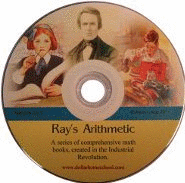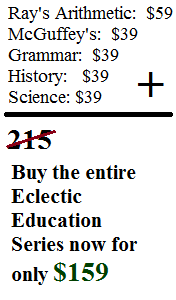|
Dollar
Homeschool Bringing Back American Education |
|
|
||||
Eclectic Education
Series The Homeschool
Blog The Homeschool
Blog |
Aaron Jagt Memory training and the McGuffey Readers. “Train up a child in the way he should go: and when he is old, he will not depart from it” Proverbs 22:6 In this essay I will attempt to explain the value of memory, the failure of the educational system in areas unrelated to mathematics, and the possible remedy that may be employed. Memory is one of humanities greatest gifts, and how much and how clearly a person is able to recall has a great deal to do with how intelligent that person is, and what they will be capable of in life. This fact has been somewhat down-played in todays society. People have always created tools to lessen the load of mental tasks, starting with rudimentary counting aids such as fingers, and ending with the latest invention, the computer. The problem lies in the moment when an aid such as counting with fingers becomes a mental crutch; it takes quite an effort to break free from familiar processes, and stretching the mind can be uncomfortable. A child who learns to count without the use of visual aids has increased his minds capacity, allowing much greater speed, and therefore the ability to take on more complicated problems. In todays schooling establishment we have a relatively new development in that we have only one major type of mental discipline incorporated into the normal school: Mathematics. We teach many different subjects, but after the student reaches a certain point, i.e. he is able to read, write intelligibly, and carry on a conversation, we bring education almost to a halt in these areas; sometimes even before these studies are completed. Certainly, we may ask for the occasional essay, or for them to read the occasional book, but we don't expect them to produce a beautiful poem like that of Milton, or to understand a deep book on theology by Cornelius Van Til, or to stir our hearts with a speech like that of Patrick Henry. Now I don't wish to end the teaching of mathematics, many of the greatest advances we have are in mathematics or related fields such as chemistry. But if we only call for higher achievements in this field alone, is it any wonder that poetry seems like a lost art? Or that our leaders do not even write their own speeches? The problem with government schooling is that by taking on the task of teaching millions of children, the process of teaching must be formalized to whatever they believe will create the best results over all, in the same way a military is trained. (At least, we should hope this was their goal.) Throwing aside the issue of what the government deems to be the “best education” to create a stable population, the fact is that while focusing on mathematics is the best way to teach mental discipline, not all children are the same, and many will not flourish in the area of mathematics beyond a certain point. Now the dilemma the public schools face of how to give individualized education is easily answered with the homeschool movement; parents can give children exponentially more care and attention than will ever be available in a public school. So the remaining problem left to address is that of how a parent can develop the abilities of a child in non-mathematical spheres of education. Before World War 2, the advent of John Dewey and “Progressive Education” the educational scene in America was very different from what we are accustomed to today. America was having one of the most prosperous eras in human history, the Industrial Revolution. During that period, education in America was dominated by the most successful set of text books ever written, the Eclectic Education Series, a series which had one set of books in particular that out-shone all of the others, a set of books which is still famous today: the McGuffey Readers. The style of American education in those years was one of study and recital; a student would study a lesson from a book, and then would recite the lesson either as part of the class or before the class on his own. The teacher might occasionally explain a point, but lectures were seldom given, especially in the small schools where there were a very large variety of age groups. Children would usually be able to read before ever going to school, having been taught at home. Recital, the act of copying or repeating, is the most basic and fundamental process of learning. Most of the study of mathematics is simply the repeating of processes of increasing difficulty; the wording and content of the problem will vary, and some explanation is given so that the process may be understood, but at it's basic level it is simply repetition. Upon understanding this, isn't it strange that copy work in art and writing is sneered at and discouraged? Instead students are taught to be critics, with classes on how to dissect and analyze the works of Shakespeare; and are told to be “original thinkers”. So now rather than standing upon the shoulders of the giants of our past, we are teaching our children to tear them down, to start from scratch in a futile effort to think of something completely different. If there was nothing new under the sun when Solomon was around, how can we expect to advance if we keep starting over? The method of recital or memorization of the best works from the past has been a major part of every type of education throughout history. For example: the ancient Chinese game of GO has been around for thousands of years, and since the Chinese tend to figure out a process that works and then pass it down, the methods of teaching the game are also very old. When a person wishes to study and become proficient at the game, part of the traditional method of teaching is to give the student a 100 of the best games of GO ever played, by the greatest masters. These 100 games are to be memorized by the student, so that the tactics and strategies used become a part of his repertoire. By doing this he can incorporate these processes into his own games, and create his own style. The role the McGuffey Readers played in education was to provide a collection of the best works ever written, or speeches recorded; the cream of the crop. This, along with the Bible, was memorized and recited daily by students throughout the United States. By doing this, not only did the child learn the processes of writing and of speech, the grammar, spelling, vocabulary, and rhythm; but he learned about history, morals, and true patriotism. And, as an effect of this process, the student strengthened his mind and his memory. It is important to state that the recitals of the speeches and other content included in the Readers was not allowed to be a dull utterance of the words, rather they were to be declaimed, spoken with fervor, feeling, and correctness in regards to proper pronunciation, in such a way as to express the thoughts of the author to all hearers. To this end the Readers included directions on rhetoric, and a guide for this subject was grafted into the series as the 5th reader. The proof of the positive effect of routine memorization on the mind, it's aid in causing an increased ability to remember can be found simply by looking at some of the chapters for recital found in the later books, in which the complex poems and passages for memorization sometimes encompass several pages in length. The students would sometimes hold contests, in which they competed at reciting one passage after another, attempting longer pieces in an effort to out last the others. The author of the McGuffey Readers, William McGuffey had himself a remarkable memory, and was able to recite entire books from the Bible. Some of the historical proofs and successes of this method can be found in the book A History of the McGuffey Readers by Henry H. Vail. In conclusion: as the old saying goes, practice makes perfect. Almost every skill a person might achieve is accomplished through practice. Like the ability to play an instrument, to draw or sing, other abilities such as writing and even the memory can be improved through practice. A great resource for quality educational books for your homeschool is the Eclectic Education Series, a collection of books which provided Americans with some of the best educations in the world, before John Dewey and the demise of American education. Click Here to learn more. |
 |
|
|
|
|
|
|
|
|
|
|
|
|
|
|
|
 |
|||||||
|
|||||||
|
|||||||
|
|||||||
© Copyright Dollar Homeschool, 2009. All
Rights Reserved.